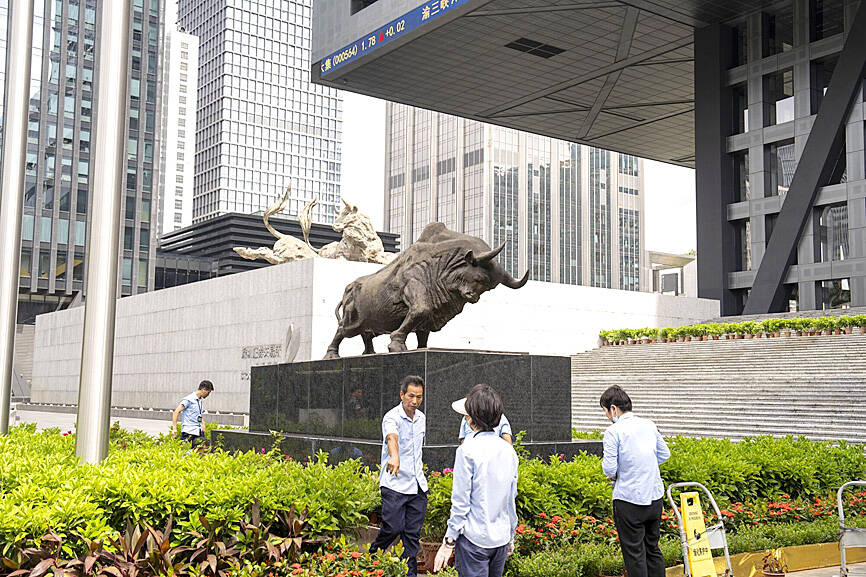China might see its first yearly outflow from equities this year — but if and when it happens, investors would not know from exchange data.
That is because the country’s stock exchanges would stop releasing daily data on overseas fund flows starting today, depriving investors of a key sentiment indicator to track the US$8.3 trillion market.
The change, first hinted at in April, comes as foreign funds have steadily withdrawn from the market, taking the year-to-date tally to negative as of Friday.

Photo: Raul Ariano, Bloomberg
Analysts saw the move as another effort by authorities to prop up the market, hoping to reduce volatility induced by high-frequency data and turn investor focus to longer-term indicators.
“Beijing stopped the release, because the data hasn’t been looking good, and it’s volatile,” abrdn Asia Ltd investment director Ng Xin-yao (黃新耀) said.
“They probably don’t want the data to amplify capital outflows,” but “it doesn’t solve the root of the problem,” he added.
If the selling persists, China might see the first annual outflow from its stock market since 2016, when Bloomberg began tracking purchases through the trading links with Hong Kong.
With the absence of data, investors would have to rely on the Chinese central bank’s quarterly reports on financial assets held by overseas entities for an indication.
Those are subject to a lag and measure the value of outstanding equities held by foreigners through broader channels, rather than flows.
China’s benchmark CSI 300 Index has fallen more than 9 percent since a May peak, as a hoped-for earnings recovery failed to materialize and policy support fell short.
Stocks have flopped even with massive purchases by state funds, with estimates that they plowed the equivalent of US$66 billion into exchange-traded funds this year.
There is little sign that an economic recovery is afoot. The latest data showed a surprise slowdown in fixed-asset investment and a softening in industrial production.
Global funds might find more reasons to shun China in the run-up to the US presidential elections, as anti-Beijing rhetoric and unfavorable trade measures are expected to gather pace.
“Market sentiment stagnates as more disappointing macro prints are released and policy easing remains reactive,” Morgan Stanley analysts including Laura Wang (王瀅) wrote in a note on Thursday. “We expect market volatility to remain relatively high and advise positioning more defensively in the near term.”
The latest decision followed an end to disclosing data on intraday flows through the trading links in May.
Last year, China asked fund houses to stop displaying real-time estimates of mutual fund products’ net value.
The lack of data transparency has been a constant issue in China, where the publication of some statistics has ceased without explanation — particularly in cases where the information has not been favorable for the economy or markets.
After the new rule takes effect, the only daily data published by the exchanges would be the total turnover and the number of trades made in stocks and exchange-traded funds via the Hong Kong links, as well as the turnover of the 10 most active securities. The total number of shares held through the links would be disclosed on a quarterly basis.
Real-time trading data for flows from China to Hong Kong, referred to as the southbound data, would still be available after this month’s deadline.

In Italy’s storied gold-making hubs, jewelers are reworking their designs to trim gold content as they race to blunt the effect of record prices and appeal to shoppers watching their budgets. Gold prices hit a record high on Thursday, surging near US$5,600 an ounce, more than double a year ago as geopolitical concerns and jitters over trade pushed investors toward the safe-haven asset. The rally is putting undue pressure on small artisans as they face mounting demands from customers, including international brands, to produce cheaper items, from signature pieces to wedding rings, according to interviews with four independent jewelers in Italy’s main

Macronix International Co (旺宏), the world’s biggest NOR flash memory supplier, yesterday said it would spend NT$22 billion (US$699.1 million) on capacity expansion this year to increase its production of mid-to-low-density memory chips as the world’s major memorychip suppliers are phasing out the market. The company said its planned capital expenditures are about 11 times higher than the NT$1.8 billion it spent on new facilities and equipment last year. A majority of this year’s outlay would be allocated to step up capacity of multi-level cell (MLC) NAND flash memory chips, which are used in embedded multimedia cards (eMMC), a managed

Japanese Prime Minister Sanae Takaichi has talked up the benefits of a weaker yen in a campaign speech, adopting a tone at odds with her finance ministry, which has refused to rule out any options to counter excessive foreign exchange volatility. Takaichi later softened her stance, saying she did not have a preference for the yen’s direction. “People say the weak yen is bad right now, but for export industries, it’s a major opportunity,” Takaichi said on Saturday at a rally for Liberal Democratic Party candidate Daishiro Yamagiwa in Kanagawa Prefecture ahead of a snap election on Sunday. “Whether it’s selling food or

In the wake of strong global demand for AI applications, Taiwan’s export-oriented economy accelerated with the composite index of economic indicators flashing the first “red” light in December for one year, indicating the economy is in booming mode, the National Development Council (NDC) said yesterday. Moreover, the index of leading indicators, which gauges the potential state of the economy over the next six months, also moved higher in December amid growing optimism over the outlook, the NDC said. In December, the index of economic indicators rose one point from a month earlier to 38, at the lower end of the “red” light.